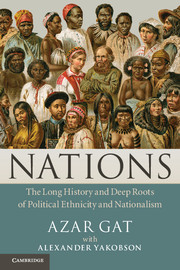Book contents
- Frontmatter
- Contents
- Acknowledgments
- 1 Introduction: is nationalism recent and superficial?
- 2 The evolution of kin–culture communities
- 3 From tribes to statehood
- 4 Premodern ethne, peoples, states, and nations around the world
- 5 Premodern Europe and the national state
- 6 Modernity: nationalism released, transformed, and enhanced
- 7 State, national identity, ethnicity: normative and constitutional aspects
- Conclusion
- Notes
- Index
4 - Premodern ethne, peoples, states, and nations around the world
Published online by Cambridge University Press: 05 February 2013
- Frontmatter
- Contents
- Acknowledgments
- 1 Introduction: is nationalism recent and superficial?
- 2 The evolution of kin–culture communities
- 3 From tribes to statehood
- 4 Premodern ethne, peoples, states, and nations around the world
- 5 Premodern Europe and the national state
- 6 Modernity: nationalism released, transformed, and enhanced
- 7 State, national identity, ethnicity: normative and constitutional aspects
- Conclusion
- Notes
- Index
Summary
With the rise of the state we are entering a more familiar territory, at least for one side of the debate on the nation. Modernists have scarcely dealt with premodern states, except for pronouncing that such states did not rest on national or ethnic foundations, sentiments, and identity. According to this view, ethnicity, while existing, was largely devoid of political significance. States were allegedly based on other principles and were supra-ethnic. In reaction, traditionalists have sought to show that nations and national sentiments existed before modernity. Scholars mostly concentrated on early modern and late medieval Europe. But some of them, such as Anthony Smith, Steven Grosby, and Aviel Roshwald, went further, to the ancient Near East and classical Greece. I share many of their views, and wish to broaden the perspective as much as possible, to other continents, civilizations, and historical periods. Although the heavy European bias in the study of nationalism is well recognized, too little has been done to correct it. What follows is an examination of premodern polity types: petty-states, states, and empires. It intends to establish how central ethnicity and political ethnicity – including its national form – were to states’ existence and conduct from the very beginning of statehood. To add to the confusion, there are modernists also with respect to the state who claim that the state is a modern creation. But in my vocabulary states are old and the modern state is merely a new stage in their development.
- Type
- Chapter
- Information
- NationsThe Long History and Deep Roots of Political Ethnicity and Nationalism, pp. 67 - 131Publisher: Cambridge University PressPrint publication year: 2012



